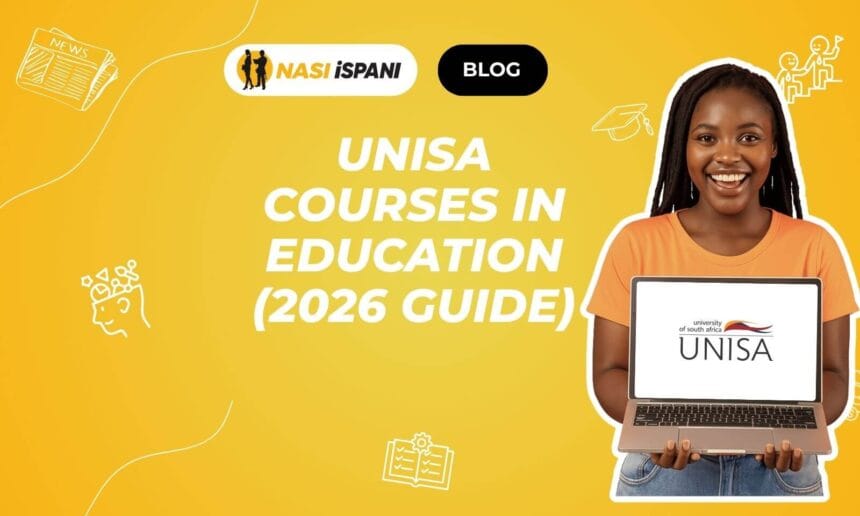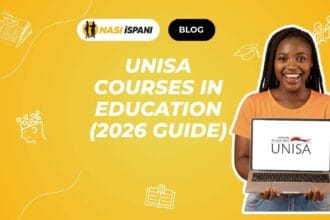The University of South Africa (UNISA) is the country’s largest distance-learning institution, offering thousands of students the opportunity to study from anywhere in South Africa and beyond. With South Africa facing a growing teacher shortage, particularly in Mathematics, Science, and Early Childhood Development, UNISA’s education qualifications play a vital role in preparing the next generation of educators.
- Why Study Education at UNISA?
- UNISA Education Qualifications Overview
- Higher Certificates in Education
- Advanced Certificates in Education
- Postgraduate Certificate in Education (PGCE)
- Diplomas in Education
- Advanced Diplomas in Education
- Bachelor of Education (BEd Degrees)
- How to Apply for UNISA Education Courses (2026)
- Career Opportunities with a UNISA Education Qualification
- Important Notes for Students
This guide will help prospective students explore the full range of Education courses available at UNISA in 2026, from Higher Certificates to Bachelor of Education degrees, and choose the best pathway for their teaching career.
Why Study Education at UNISA?
- Flexibility of distance learning – Study from home while balancing work, family, and other commitments.
- Affordability – UNISA fees are lower compared to traditional universities, making education more accessible.
- Accreditation – All qualifications are recognised by the Department of Higher Education and Training (DHET).
- Diverse pathways – Choose from Higher Certificates, Diplomas, BEd degrees, or a PGCE depending on your academic background.
UNISA Education Qualifications Overview
UNISA offers qualifications at multiple levels:
- Higher Certificates – Entry-level qualifications that serve as a bridge into teaching degrees.
- Advanced Certificates – Professional development for qualified teachers.
- Postgraduate Certificates in Education (PGCE) – For graduates who want to transition into teaching.
- Diplomas – Focused qualifications like Early Childhood Education.
- Advanced Diplomas – Specialist teacher training for career growth.
- Bachelor of Education (BEd) – Comprehensive teaching degrees.
Higher Certificates in Education
3.1 Higher Certificate in Education (Foundation & Intermediate Phase) – (90093 – FIP)
- Focus: Prepares students for early childhood and primary school teaching (Grades R–6).
- Entry requirements: National Senior Certificate (NSC) with at least 30% in the language of teaching and learning.
- Career opportunities: Foundation and intermediate phase classroom assistant or pathway into a BEd degree.
3.2 Higher Certificate in Senior Phase Maths & Science Education – (90093 – SMS)
- Covers: Basics of Mathematics and Science teaching in the Senior Phase.
- APS requirement: Minimum of 15 points.
- Next step: Can articulate into a BEd in Senior and FET Teaching.
3.3 Higher Certificate in Senior Phase and FET Teaching – (90093 – SPF)
- Covers: Introductory training for teaching in Senior Phase and Further Education and Training (Grades 7–12).
- Pathway: Provides access to BEd Senior Phase & FET programmes.
Advanced Certificates in Education
4.1 Intermediate Phase Mathematics & English Teaching – (90177)
- Designed for: Qualified teachers who want to strengthen their teaching in Maths and English.
- Purpose: Upskill educators to meet school demands for critical subjects.
Postgraduate Certificate in Education (PGCE)
5.1 What is a PGCE?
A PGCE is a one-year professional teaching qualification for students who already hold a relevant degree. It is essential for those who want to teach in the Senior Phase (Grades 7–9) and FET Phase (Grades 10–12).
5.2 Available PGCE Specialisations
- Languages & Arts: English, Music, Visual Arts, African languages.
- Sciences: Life Sciences, Physical Sciences, Mathematics, Agricultural Science.
- Technology & Business: Accounting, Business Studies, Information Technology, Engineering Graphics.
- Social Sciences: History, Geography, Tourism, Life Orientation.
- Specialised Subjects: Hospitality, Religious Studies, Sport Science.
Diplomas in Education
6.1 Diploma in Early Childhood Care and Education – (90187)
- Focus: Equips students to work with children from birth to Grade R.
- Entry requirements: NSC with relevant passes in the language of teaching.
- Careers: ECD centre practitioner, preschool teacher, Grade R educator.
Advanced Diplomas in Education
These programmes are designed for qualified educators aiming to specialise:
- Adult and Community Education (90190) – For teaching adults and non-formal education.
- Intermediate Phase Mathematics Teaching (90113) – Deepens knowledge of Maths teaching in Grades 4–6.
- Teaching & Learning Support (90184) – Focused on educational support and learner intervention.
Bachelor of Education (BEd Degrees)
8.1 BEd Foundation Phase Teaching – (90102)
- Duration: 4 years.
- APS: Minimum of 23 points.
- Career: Teaching learners from Grades R–3.
8.2 BEd Intermediate Phase Teaching – (90103)
- Focus: Teaching Grades 4–6.
- Specialisations:
- Mathematics & Life Skills
- Mathematics & Natural Science
- Mathematics & Social Sciences
8.3 BEd Senior Phase & FET Teaching – (90104)
- Covers: Teaching Grades 7–12.
- Specialisations include: Agricultural Science, Economics, Technology, Life Sciences, Languages, Geography, Tourism, and more.
- Note: Students must choose their subject combinations carefully, as demand for Maths, Science, and Technology teachers is higher.
How to Apply for UNISA Education Courses (2026)
- Application method: Apply online via the UNISA website.
- Key dates: Applications typically open in September and close in October (confirm on UNISA’s site).
- Application fee: Non-refundable (around R135).
- Documents required: Certified copy of ID, academic transcripts, proof of payment, and any additional supporting documents.
Career Opportunities with a UNISA Education Qualification
- Foundation Phase teacher (Grades R–3).
- Intermediate Phase teacher (Grades 4–6).
- Senior Phase & FET teacher (Grades 7–12) in high-demand subjects.
- Early Childhood Development (ECD) practitioner.
- Adult and community education facilitator.
Read more: 10 UNISA Online Application Mistakes to Avoid
Important Notes for Students
- APS requirements differ across programmes.
- Some courses require subject-specific passes (e.g., Maths for Maths teaching).
- PGCE applicants must already hold a completed undergraduate degree in a teaching subject.
- All education graduates must register with the South African Council for Educators (SACE).
Also check: NSFAS Learning Material Allowance 2025 What You Need to Know
Choosing the right UNISA education course in 2026 depends on your academic background, career goals, and personal interests. Whether you’re starting with a Higher Certificate, pursuing a full BEd degree, or transitioning into teaching with a PGCE, UNISA offers accessible, flexible, and accredited pathways into the profession.
Start your application early for 2026 to secure your place and take the first step toward becoming a qualified teacher in South Africa.



